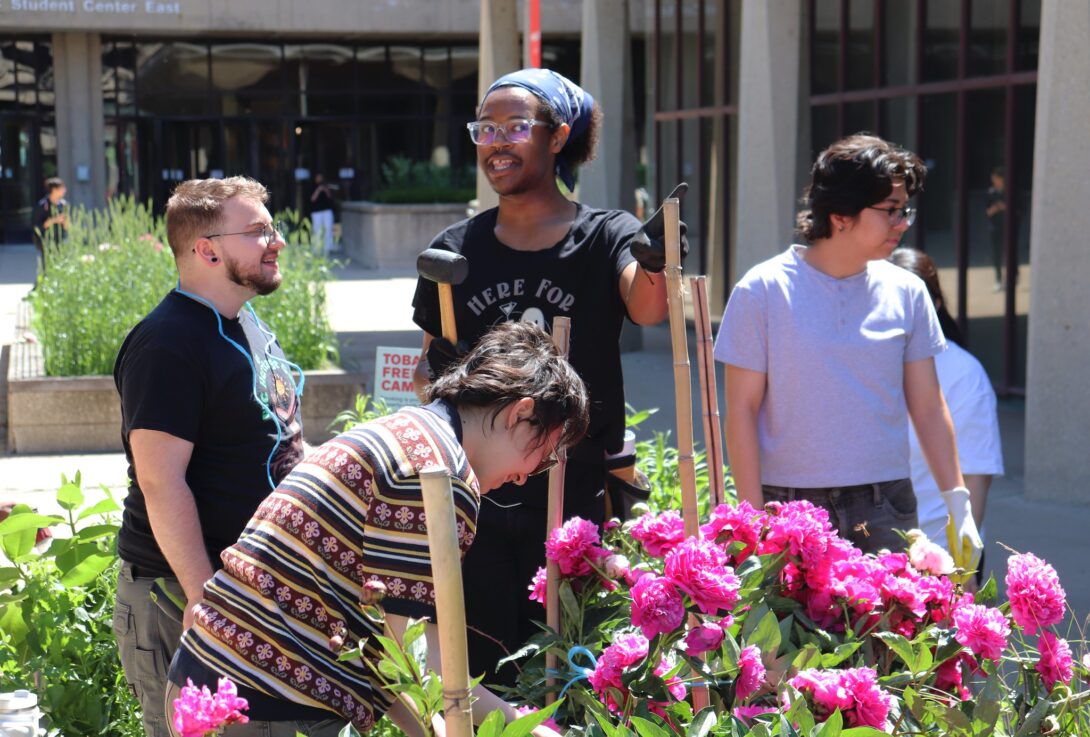Promoting Climate Action Through Cultural Heritage and Environmental Justice
x

At the University of Illinois Chicago (UIC), the Heritage Garden demonstrates how cultural heritage and environmental justice can advance climate action. As a hands-on learning initiative of the Centers for Cultural Understanding and Social Change (CCUSC), the Heritage Garden integrates sustainability into the university’s operations through its paid internship program and community engagement efforts. By connecting environmental sustainability, cultural diversity, and social justice, this program prepares students to address climate and environmental challenges.
A Vision Rooted in Research and Equity
The Heritage Garden originated from research conducted by Dr. Rosa Cabrera and Dr. Lori Baptista in 2009 while at the Field Museum. Their work, commissioned by the City of Chicago, identified key community concerns, including immigration, youth development, cultural heritage, and environmental justice, emphasizing the need to incorporate these into climate action. This vision became a reality when they joined UIC as directors of the Latino Cultural Center and Black Cultural Center, utilizing the newly established Sustainability Fund to create the Heritage Garden.
The program recruits interns each summer, providing opportunities to build skills and assume leadership roles. Under the guidance of the Latino Cultural Center staff, students lead initiatives that connect horticulture with environmental justice and cultural narratives. Weekly discussions, research projects, and peer-led activities build knowledge and empower students to develop solutions for climate challenges.
Addressing Climate Challenges Through Urban Gardening
The Heritage Garden includes nine satellite gardens featuring native and culturally significant plants. Sites such as the Shikwaaka Garden, developed in partnership with the American Indian Center of Chicago, and a Monarch Butterfly Habitat illustrate the role of urban gardening in mitigating climate change. These gardens absorb rainwater, improve air quality, sequester carbon, and support biodiversity, providing practical examples of urban climate resilience.
To extend its impact, the program includes mobile resources such as a seed library and tea apothecary, which share knowledge and materials with communities throughout Chicagoland. Annual events such as the Fall Harvest Festival and Spring Seed Swap bring together university and community partners, fostering connections for collaborative action.
Strengthening Community Engagement
On a busy urban campus, the Heritage Garden provides spaces for engagement and reflection. Students and community members often visit these gardens, which promote a sense of belonging that supports academic success and emotional well-being. Alumni frequently share how their involvement with the program informed their career paths in environmental justice, conservation, and cultural work.
During its 10th anniversary, the Heritage Garden launched a tea library created in collaboration with a community artist and student leaders. The event also featured an archive documenting the program’s history to inspire future participants and guide ongoing efforts.
Advancing Climate Justice and Equity
The Heritage Garden is rooted in principles of climate justice, prioritizing equitable pay for student interns and community partners. The program acknowledges the university’s location on the occupied land of the Odawa, Ojibwe, and Potawatomi peoples and emphasizes the importance of addressing this historical context in its work. By integrating climate justice into its curriculum and practices, the program equips students to lead in policy, land stewardship, and cultural advocacy.
Collaborating to Address Climate Challenges
The Heritage Garden partners with internal groups such as UIC’s cultural centers, the Disability Resource Center, the Biology Department, and the Office of Diversity and Equity. External collaborations include organizations such as the Little Village Environmental Justice Organization, the American Indian Center of Chicago, and the Chicago Cultural Alliance. These partnerships facilitate access to resources and expand the program’s reach.
Through its curriculum and projects, the Heritage Garden emphasizes peer-to-peer education, resource-sharing, and seed saving, which extend the life of materials and support urban gardening efforts. Students contribute their knowledge as part of decision-making processes, such as serving on the UIC Sustainability Fund advisory board to allocate funding for sustainable campus projects. These contributions ensure that the program aligns with broader institutional and community goals.
The Heritage Garden demonstrates how integrating cultural heritage and environmental justice can address climate challenges. The program supports urban resilience and promotes sustainable practices by focusing on experiential learning and community partnerships. Through its work, the Heritage Garden continues to create opportunities for students and communities to engage in climate action.